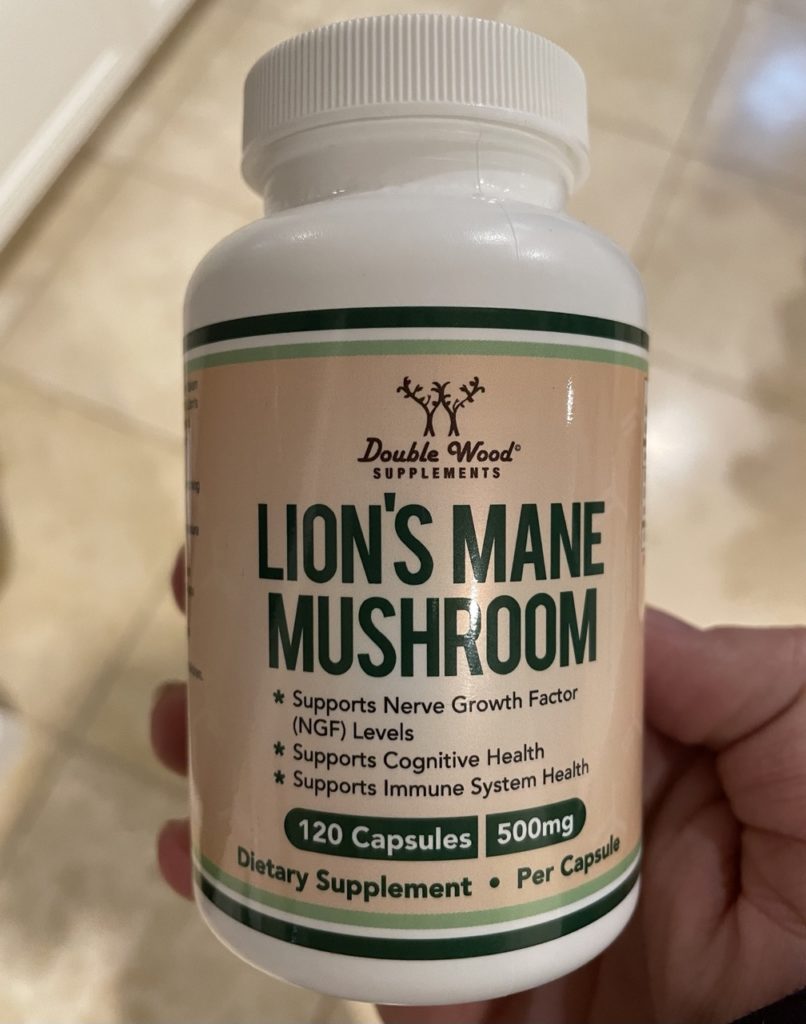Lion’s mane is a large white, somewhat fluffy, somewhat hairy mushroom that is both fun to look at and hugely beneficial for certain conditions.
I first learned about lion’s mane from Casey Means, MD, and my husband started taking it regularly for its benefits on cognition. Lion’s mane is shown to promote nerve growth and prevent memory loss and degeneration, among other benefits. An interesting aspect to lion’s mane is that it helps while you are taking it, but the benefits recede almost immediately if you stop taking it.
What is Lion’s Mane Used For?
Lion’s mane mushroom is a naturally occurring mushroom with medicinal properties. It can be taken in pill form (what I did to get relief from low intracranial pressure), in teas, eaten with food, or even broth.
Lion’s mane is used primarily for cognitive function, and has been shown to reduce the symptoms of Alzheimer’s. It can reverse or delay memory loss (as long as you continue taking it), and it also promotes nerve regeneration and healing of nerve injuries.
Other benefits associated with lion’s mane include:
- immune system support
- anti-inflammatory
- aids in fighting depression and anxiety
- anti-oxidant
- lowers the risk of heart disease and cancers in animals
Lion’s Mane and CSF Leaks
When I was diagnosed with a cerebrospinal fluid (CSF) leak in early 2021, I was looking for anything to help with my healing and reduce the debilitating headaches and other neurological symptoms that accompany a CSF leak. My husband saw a blogger talk about getting relief from lion’s mane, so I started taking it myself.
I very quickly – within a day or two – started noticing an improvement in the positional headaches that accompany CSF leaks and low intracranial pressure. I could tell from one day to the next if I had forgotten to take my lion’s mane, and I could salvage the day by taking it, since it started taking effect very quickly.
While I don’t believe it truly aided in healing me (that was done with an epidural blood patch guided by CT), it was instrumental in reducing my symptoms while I waited for appointments to be scheduled. Overall, I went about 6 weeks from diagnosis to the procedure to heal up my leak, due to some scheduling and miscommunication errors. During that time, I took 2 lion’s mane mushroom pills per day.
I stopped taking the lion’s mane for my CSF leak when I got my patch, so that I didn’t continue to raise my intracranial pressure.

Which Lion’s Mane Mushroom is Best for CSF Leaks
We use and love Double Wood Supplements lion’s mane mushroom. The capsules are easy to swallow and the quality is great. We have been buying Double Wood Supplements for years and have had a great experience. We use them, love them, and recommend them.
Double Wood Supplements lion’s mane mushroom is made in the US, which we love, and they are allergy-friendly. Lion’s mane is gluten free, vegan, soy-free, and non-GMO. All the good, and none of the bad.
Lion’s Mane Mushroom Side Effects
I did not experience any side effects from taking lion’s mane mushroom for my CSF leak. I have read some reports of upset stomach, which is easily managed by taking the lion’s mane with food.
Additionally, it possibly lowers your ability to clot, so make sure to tell your doctor you are taking it before undergoing any major procedures, and stop taking it if advised.
*This post contains affiliate links. If you make a purchase after clicking on one of our links, we receive a small commission from the retailer, at no extra charge to you. We only recommend products we actually use and love, never products that are gifted or where we are paid to promote.
